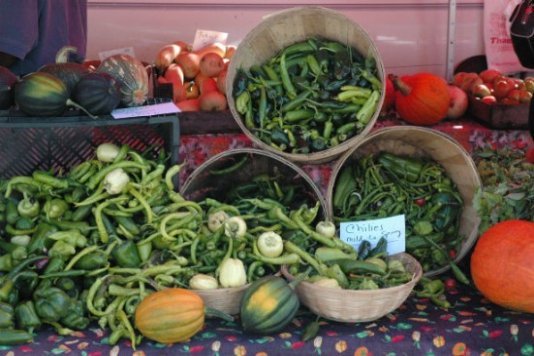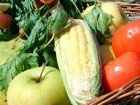What is Community Supported Agriculture? Pros and Cons of SCA Farming
Community Supported Agriculture has been around for some time now. However, what is it all about? What is it exactly, and what are the pros and cons of such a system?
Read
this
article by Jesse Taylor on CSA
farming.
Its a very objective piece of
writing looking at what it is all about, plus the advantages and
disadvantages of such a system.
Since buying our little farm place, 3 years ago, we've been researching the CSA concept and evaluating the "pros and cons" of becoming an active CSA, ourselves. So, while we've got no real, "hands-on" experience, as of yet, we have visited a Community Supported Agriculture operation and discussed, at length, what it takes to run a successful Community Supported Agriculture and what such an operation has to offer both the farmer and the customer.

WHAT IS COMMUNITY SUPPORTED AGRICULTURE?
If I may, I would like to "field" the question of "What is Community Supported Agriculture?",not only to help answer that question, but to have my answers and views "critiqued" by those on the list with more experience. To that end, I invite comment and correction of whatever I may set forth. After all, this is a learning experience for me and I'm counting on you, my farming brethren, to keep me from being ignorant all my life.
The letters "CSA" stand for "Community Supported Agriculture". At first glance, that may sound like a program to bring inner-city youth and older residents together by adapting a vacant city lot into a community garden where everyone shares in the work and the bounty it may produce.
As I understand it, the original concept of the Community Supported Agriculture was, indeed, aimed at bringing communities closer together through labor participation in an agricultural setting. However, I offer the opinion that the original concept has been modified by a positive effort to better serve the wants and needs of a greater cross section of the American people, both farmer and consumer.
For those who may object to these modifications being called Community Supported Agriculture, may I suggest such operations be thought of as "consumer shared agriculture". Admittedly, some of these changes seem to have been necessitated in an effort to negotiate a minefield of legal requirements and regulations imposed upon both parties.
While I recognize and applaud this list for seeking to distance itself from any political discussions, I feel it is necessary to, briefly, touch upon this subject in order to form a more perfect understanding of why a Community Supported Agriculture exists and why they deserve support.
To quickly summarize, when you get right down to brass tacks, it would appear that governmental legislation seems to 'pigeon hole' a farm as being nothing more than a facility for the production of raw materials to be processed elsewhere. For instance, I can't sell you a fresh cup of raw, whole milk, but I can sell you a "share" in my dairy herd. In effect, you own a portion of the cows, perhaps a cow, and are entitled to use the milk from that cow as you see fit. Naturally, you're going to be reimbursing me for the expense of the feed and the electricity, roughly estimated, that it takes to pump water, provide lighting and, perhaps, run the milking machine for the benefit of your cow.
Also, I can charge you a "boarding fee", much the same as if you were boarding a horse at a stable or a dog at a kennel. A Community Supported Agriculture seeks to take that concept a few steps farther. Instead of merely providing a share in a dairy herd, you will be purchasing a share in the production of the whole farm or in the production of only a certain aspect of that farm's operation.
For instance, when you sign up for a Community Supported Agriculture membership, you may be entitled to a certain amount of the fruits, herbs, flowers and/or vegetables produced. You may be entitled to a certain amount of the poultry and/or eggs produced. You may be entitled to a certain portion of the beef or pork produced. You may even be entitled to a certain amount of various other things, like fish, mushrooms or firewood. The variety and quantity of a share is strictly between the farmer and the consumer.
Legally, the farmer may not be able to sell you unwashed, un-inspected, farm fresh eggs or an un-inspected poultry carcass, but he can sell you a live bird and that entitles you to the eggs or even the feathers, if you want them.
The farmer may not be able to sell you un-inspected, prepackaged pork or beef, but he can sell you a live beef or pork critter. He can even deliver it to your choice of processing facilities and either pick up and deliver or hold the packaged meat for you until you pick it up, just as any good friend would do for you.
As I understand it, if the farmer is willing and if you're up to the challenge, you can even go to the farm and butcher out your own livestock, just like free Americans have always done. Your good buddy, the farmer, is even allowed to assist you, provided he doesn't charge a fee for doing so or for using any of his facilities, if any exist. This is a very common practice among the Amish, as well as with "good old boys" all across this great land. It has, absolutely, nothing to do with their religion and everything to do with freedom.
Granted, those are extreme examples of what may, or may not take place, but a Community Supported Agriculture may be considered an extreme way of conducting the, already extreme, business of farming. Certainly, it takes an extreme commitment on behalf of the farmer, who must be willing to go to great lengths of time and trouble to, reasonably, insure that an abundant supply of product will be available for the CSA "subscribers" who have agreed to share in his farming endeavors and have invested money to enable them to do so.
One more thing to consider, does your CSA offer to let you help with the daily chores of tending to your share of the farm? While you'll find quite a few Community Supported Agriculture farms who willingly accept your generous offer to share in some of the workload, and may offer share discounts for doing so, there are a few of them who would rather you limit your activity to the financial assistance and leave the actual application of farming techniques to them. CSA farmers cite three reasons for this.
Reason number one is the lack of the laborer's experience and the time it takes to teach workers to properly perform various tasks. From the farmer's point of view, this is perfectly understandable. As an example, I'll point out my own experience concerning the well intentioned, but misguided, efforts of a friend's wife. Knowing that the garden needed weeding, she set forth to accomplish the task. Unfortunately, she couldn't tell a young tomato plant from a weed and destroyed the entire tomato patch.
Reason number two has to do with liability for accidents. Most farms carry an umbrella policy, which protects visitors with insurance coverage, but that doesn't stop a farmer from being sued. It's certainly something to be feared, as the money to fight the lawsuit can be a severe drain on an already tight farming budget. You may win the case and still lose the farm.
Lawyers like to use the term of "creating an attractive nuisance" to justify why someone got hurt by being where they knew they weren't supposed be in the first place. A farm pasture, woodlot or pond presents an attractive nuisance which, apparently, trespassers don't have the personal discipline to resist. Neither do they possess the foresight to anticipate trouble nor the personal integrity to accept responsibility for their own actions. If someone can break the law by trespassing and still sue you, can you imagine how much more legal leverage someone would have if you actually invited them onto the farm? Call this "paranoid thinking" if you like, but it is a concern to a lot of honest, well meaning folks.
But, what if you only want to visit the farm to picnic, hike, fish or just see the plants and animals? Well, believe it or not, by allowing recreational use of the farm, the farmer could be breaking the law. That activity may place his operation under the heading of "theme park". I know, I know, it sounds perfectly absurd, but it's a legal fact in many areas.
Remember, as a Community Supported Agriculture shareholder, you've only got a vested interest in what the land produces, not in the land, itself. Your presence on that land may even be considered as posing a health threat. You're tracking your germs around and, as the law interprets it, a farm environment should be kept as sterile as possible. Even wildlife should be excluded, since they have been known to carry insects and disease. We can't encourage farm livestock to build up immune systems, can we? I know, I know, ridiculous as all this seems, so far-fetched as to be beneath contemplation, but it's, none the less, a fact of legality in today's world and it's a great consideration for a lot of, otherwise, neighborly farm folks. In any or all cases, you'll have to discuss such things with your farmer of choice and clarify what is and isn't allowed.
WHY BECOME A COMMUNITY SUPPORTED AGRICULTURE FARM OPERATION?
The main reason for becoming a Community Supported Agricultural farm is that we think we would enjoy growing food, and a diversity of it, a whole lot more than we'd enjoy concentrating on planting the whole place in grains and being done with it. We're in the process of learning the fine art of raising vegetables and are trying to prove to ourselves that we can do it with consistency.
Second, reducing our reliance on outside food sources gives us peace of mind. All these food recalls and reports about food contaminants have us scared. Realistically, even though our bureaucracy tries to achieve proper food inspection, it isn't possible. The volume of food processing is, simply, too great. The inspector can't place a 55-gallon drum of ground meat under his thumb and follow it from the grinding machine to my kitchen table. It can't be done. For our own safety and for the safety of our family and friends, we feel we must try to localize our food consumption.
Third on the list is good taste and nutrition. Simply, organic food tastes better and, while we have no first hand, side by side, laboratory comparisons, we're convinced that the fresher our food is, the more nutrition it's bound to contain.
Forth, we only have 28 acres and only 18 of that is under till. Anyone who plants grains will tell you that isn't nearly enough ground for grain farming. You can't raise enough to get your machinery paid off. It's not nearly enough for long-term, large-scale production of livestock, either. Our only option is to think outside the box, as they say. We've got to find an alternative. We've got to find a "niche" market. We believe that market may be catering to folks who, like ourselves, desire better tasting, more nutritious,locally grown foodstuffs.
Finally, we have a vision, call it a "romantic ideal" of what a farm should be. We can tell you what it shouldn't be. It shouldn't be row after row shiny, steel sided buildings full of imprisoned livestock, living their short lives under artificial lighting, never knowing the feel of grass under their feet, the freshly scented air in their nostrils, the cool breeze in their face, the warmth of the sun or the cooling rain against their skin. That is an unnatural life and is an insult to all animal life on this planet. Maybe not everyone agrees with the vegetarians, who consider it inhumane to kill animals for human consumption, but everyone should, certainly, consider it inhumane to raise them in a fully enclosed, imprisoned environment.
Neither do we feel a farm should consist of acre after acre of plowed earth, so severely depleted of nutrients that chemical agents must be poured onto the soil so as to coax the production of genetically altered grains and discourage the growth of weeds. We think we can do better than that and we feel there are other folks who think it can be done better. Maybe, just maybe, some of those folks may be willing to support our efforts to transform and rebuild one small piece of America into a more natural environment, an environment that won't become a brown, barren, wasteland, devoid of life from the end of harvest season until the first sprouts of spring.
We envision a farm place that can provide fresh orchard and vine fruits, herbs, nuts and vegetables. We envision a farm place that can provide fresh meats based on a rotational grazing program that enhances both the life of the soil as well as the life of the plants and animals that depend on it.
We envision a farm where honest, friendly, hard working people can feel welcome and can bring their children and say to them, "This is how it used to be, and how it should be." We envision a farm that allows us to get to know our neighbors and treat them as friends, instead of only as customers. That's what a Community Supported Agriculture means to us.
You can see why a Community Supported Agriculture farm may not be available in most communities. As was previously mentioned, it takes extreme dedication to produce such a thing in this day and time. Our American lifestyle has evolved to move at such a fast pace that, all too often, the speed and convenience of food preparation is the deciding factor in whether or not we get to eat a supper before bedtime. For far too many, the speed of convenience may be a deciding factor at any mealtime.That means that a Community Supported Agriculture's share of the food market will never be a large one. In fact, it's necessary that it not be large. Only just so many acres can be managed without lapsing back into industrial farming practices that are so typical of the "corporate farms", so often found in America, today.
The Community Supported Agriculture farmer can only feed just so many people. These will be the "elite few" in the community. These will be the people who truly do desire to give themselves and their families the very best that their elite, community, farming operations can produce.
If there is one in your area, and if you are truly interested in providing the very best for yourself and your family, I urge you to support a Community Supported Agriculture operation, or at least, to frequent a farmer's market. Only by getting to know your local farmers can you expect to bring home the very best.
The above article on Community Supported Agriculture (CSA) was written by Jesse Taylor
DISCLAIMER:The materials contained on this website are provided for general information purposes only and do not constitute legal or other professional advice on any subject matter. https://www.countryfarm-lifestyles.com does not accept any responsibility for any loss which may arise from reliance on information contained on this site.
Did you find this page helpful?
Sharing is a way of saying, "Thanks!"
Follow Us and Keep Up to Date
CSA FARMS IN THE UK
For those of you who live in America, CSA Farming is a familiar concept. Others of us who live and farm elsewhere, it isn't a concept that has been adopted widely in other countries. And I don't know why, because it is an excellent way of being able to grow your own vegetables if you don't have that little bit of dirt that you need to do so.
There is now a community farm not far from Bristol, in the UK, in the Chew Valley run by 3 young men who are about to launch this concept this September (2009). See their website for details: The Story Community Farm to see how you may join. They offer a wide variety of subscriptions for individuals and different groups. We wish them great success and hope that many more farmers in the country will follow their lead.
BOOKS ON COMMUNITY SUPPORTED FARMING
You can Add your own Comments, on Community Supported Agriculture Here!
We have lots of pages where you can contribute to throughout this homesteading website. We love hearing from our readers, and hope you will be one of those we hear from too. Look around our homesteading website. If you have some comments on Community Supported Agriculture of your own, please submit them. All you need to do is type and submit. We will do the rest!
Leave a Comment
Do you have anything that you would like to add after reading this page? We would love to hear your thoughts. If you can add additional information to what has been written here you will be adding value to the website! No need to have any special skills - just type and submit. We will do the rest!
Other Comments
Click below to see comments from other visitors to this page...
last 20 years of CSA Not rated yet
Over the last 20 years, Community Supported Agriculture (CSA) has become a popular way for consumers to buy local, seasonal food directly from a farmer. …










New! Comments
Do you have something of value to add? Leave me a comment in the box below.